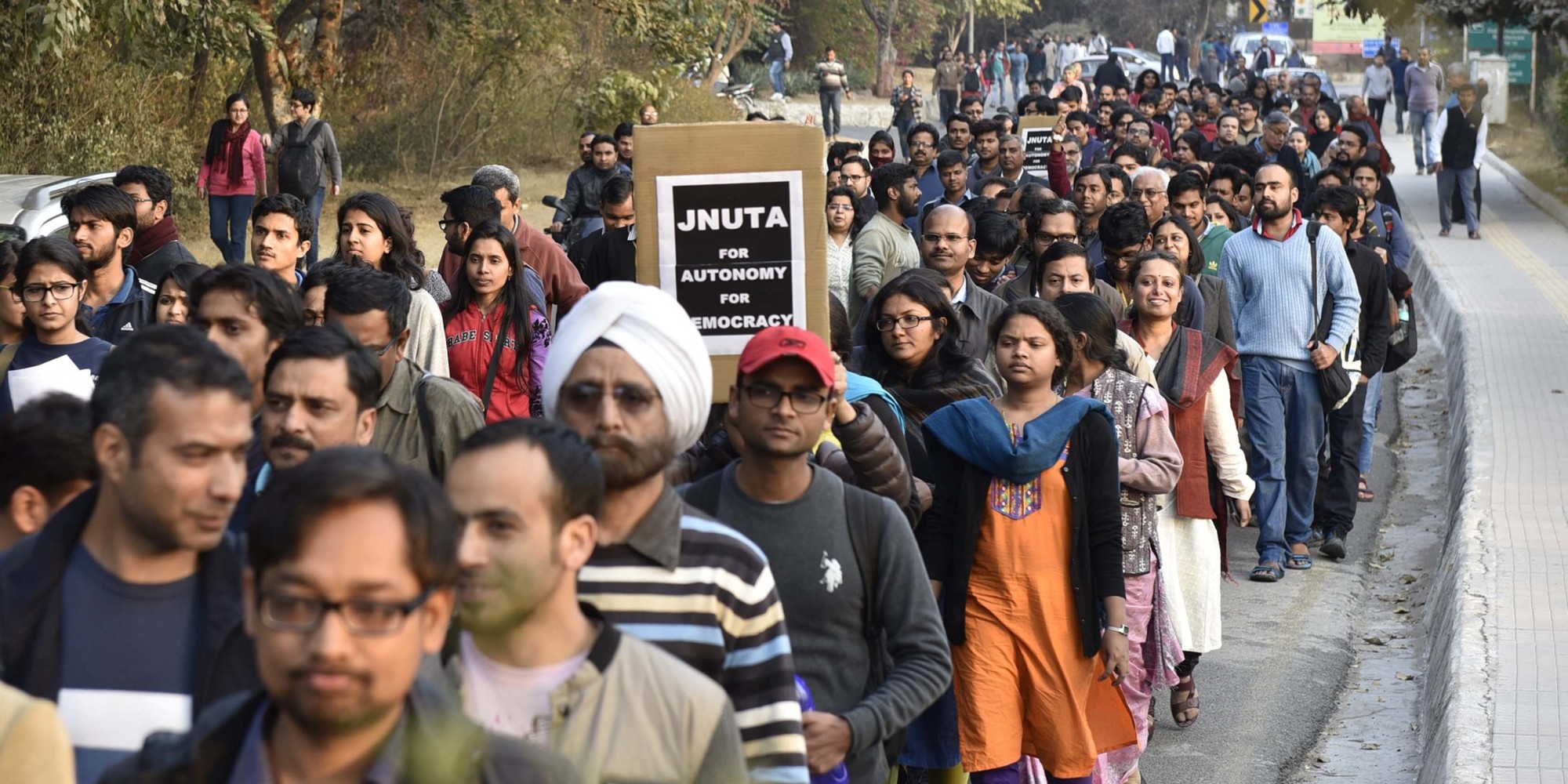CLASSIC CASE OF DOUBLESPEAK
- By : Anirban Ganguly
- Category : Articles

The JNU controversy reeks of double standards wherein the cry of ‘criminalising dissent’ cloaks the attempt to legitimise traitorous attitudes and unpatriotic acts. In this, some JNU teachers have colluded to misguide young minds and teach them the art of spiting India
I shall begin with a prefatory observation or point. US Ambassador Richard Verma, who has the habit of shooting of his mouth in a most un-diplomatic ungraciousness, will perhaps agree with most of us when we say that authorities at Harvard University or the University of Pennsylvania would not be particularly welcoming of the idea of holding a mashaal juloos — torch march — commemorating the ‘martyrdom’ of ‘Shahid’ Osama bin Laden. So obsessed was the US with Bin Laden that they shot him through the head and dumped his body in mid sea.
Instead of joining issues with the Modi administration and hectoring on how to handle dissent and free speech — an act which is, in any case, beyond his diplomatic mandate — Ambassador Verma may rather read John Kenneth Galbraith’s biography and take inspiration from how an ideal US Ambassador ought to conduct himself or herself in the Indian milieu.
On a positive side, as part of an affirmative action, Jawaharlal Nehru University’s School of International Studies or School of Social Sciences, that Mecca of dissent and free speech, may consider inviting Ambassador Verma to deliver a keynote on the origins, evolution, enactment and content of the Patriot Act (Uniting and Strengthening America by Providing Appropriate Tools Required to Intercept and Obstruct Terrorism Act). It would be a hugely beneficial public exercise.
Tapasi Mallik, the 18-year-old Dalit girl who resisted her family’s land from being grabbed in Singur in 2006, was beaten, raped and her half-burnt body tossed into the fields by Communist Party of India (Marxist) lumpens and harmads who were out to suppress and arrest the increasingly ‘bourgeois’ habits of the proletariat.
Mallik was the victim of the CPI(M)’s violent and inhuman politics in the same way Rohith Vemula had become a victim of the communist Students’ Federation of India’s subversive brand of politics. One of Vemula’s last Facebook post indicates how deeply wounded he was at being turned into a pawn by the SFI in its dialectical politics of violence and subversion. In fact, it was the CPI(M)’s brand of politics that essentially drove Vemula to despair and death.
But then, this is the brand of politics that the CPI(M) and the Left and ultra-Left fronts and militia have always practised in India. Subversion, violence, subterfuge and fascist tactics have always been the handmaidens or chosen tools of left politics in India. The Democratic Students’ Union and the All India Students’ Association, in line with the CPI(M) and the Communist Party of India, have, in fact, patronised, for long, the separatist brand of politics — A politics which denationalises, deracinates and generates disgust in one’s civilisational moorings and origins.
As religious and political activist Sita Ram Goel articulated it, “It is natural and inevitable that communism should come into conflict with positive nationalism in every country. India cannot be an exception. By positive nationalism we mean a nationalism which draws its inspiration from its own cultural heritage and socio-political traditions. Such a nationalism has its own way of looking at world events and evaluating the alignment of world forces. Such a nationalism is guided by its own past experience in safeguarding its interests and pursuing its goals.” For a political ideology which has always derived inspiration and direction from extraneous elements and forces, “positive nationalism” has always been the resisting rock.
The events and developments at the prestigious and leading JNU also brings to mind Goel’s assessment of the basic duplicitous “tactics” adopted communists of all hues in India. “Communism in India”, he argued, has developed a language “which George Orwell has described as doublespeak. In this language the traitorous and totalitarian forces represented by the communist movement are presented as patriotic and democratic forces, collaborators with communism as progressive people, positive nationalism as Hindu communalism and chauvinism.” Many people, pointed out Goel, “do not know how to decipher this doublespeak and are, therefore, trapped by it”.
The situation in JNU and its exacerbation by a section of students and teachers is a classic case of doublespeak. The cry of “criminalising dissent” is essentially a classic doublespeak to cloak the attempt to legitimise traitorous attitude and unpatriotic acts. In this doublespeak and double-act a section of the JNU teachers have actively colluded and misguided young minds and taught them, not their mandated subjects, but rather the art of spiting India.
When professor Kamal Mitra Chenoy bleats inanities on how the Rashtriya Swayamsevak Sangh and the BJP are carrying out their “fascist” agenda in JNU, it is again a case of doublespeak where the bleating intellectual is actually trying to hide his own history of kowtowing to separatists and his advocacy of secessionism and India’s vivisection.
A select group of professors at JNU have always advocated and promoted separatism of all kinds in India. It is these elements who are at the forefront today in trying to defend those who have raised slogans calling for the break-up of India.
A survey of the various statements that these professors and intellectuals have made over the years reveal a disturbing pattern — they have sided always with those sections opposed to India’s unity and integrity, have echoed the demands made by these groups and have openly advocated secessionism and violence, challenging India’s constitutional framework.
These professors have also actively participated in conference junkets that were organised by fronts/groups with the intention of championing secessionism in India. It would be worthwhile to look at some points from the plethora of material that has, fortunately, come to light.
(This is the first of a two-piece commentary.The second and concluding part of the article will be published on March 9)

















